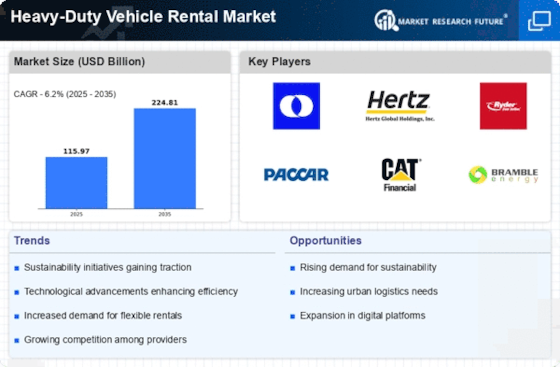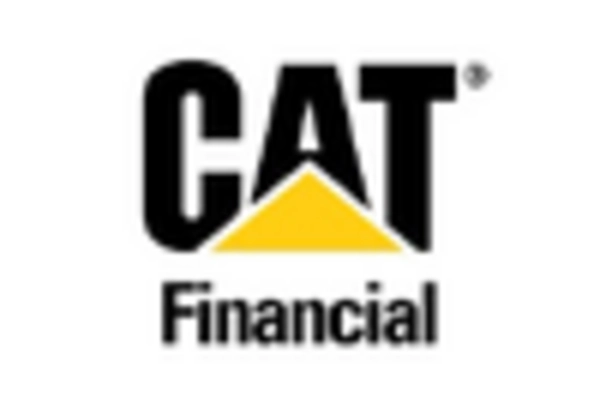-
EXECUTIVE SUMMARY
-
MARKET INTRODUCTION
-
Definition
-
Scope of the Study
- Research Objective
- Assumptions
- Limitations
-
RESEARCH METHODOLOGY
-
Overview
-
Data Mining
-
Secondary Research
-
Primary Research
- Primary Interviews and Information Gathering Process
- Breakdown of Primary Respondents
-
Forecasting Model
-
Market Size Estimation
- Bottom-Up Approach
- Top-Down Approach
-
Data Triangulation
-
Validation
-
MARKET DYNAMICS
-
Overview
-
Drivers
-
Restraints
-
Opportunities
-
MARKET FACTOR ANALYSIS
-
Value Chain Analysis
-
Porter’s Five Forces Analysis
- Bargaining Power of Suppliers
- Bargaining Power of Buyers
- Threat of New Entrants
- Threat of Substitutes
- Intensity of Rivalry
-
COVID-19 Impact Analysis
- Market Impact Analysis
- Regional Impact
- Opportunity and Threat Analysis
-
GLOBAL HEAVY-DUTY VEHICLE RENTAL MARKET, BY TYPE
-
Overview
-
Trucks
-
Buses
-
Trailers
-
GLOBAL HEAVY-DUTY VEHICLE RENTAL MARKET, BY PROPULSION
-
Overview
-
ICE
-
Electric
-
GLOBAL HEAVY-DUTY VEHICLE RENTAL MARKET, BY SERVICE PROVIDER
-
Overview
-
OEM
-
3rd Party Companies
-
GLOBAL HEAVY-DUTY VEHICLE RENTAL MARKET, BY RENTAL TYPE
-
Overview
-
Short Term
-
Long Term
-
GLOBAL HEAVY-DUTY VEHICLE RENTAL MARKET, BY REGION
-
Overview
-
North America
- US
- Canada
-
Europe
- Germany
- France
- UK
- Italy
- Spain
- Rest of Europe
-
Asia-Pacific
- China
- India
- Japan
- South Korea
- Australia
- Rest of Asia-Pacific
-
Rest of the World
- Middle East
- Africa
- Latin America
-
COMPETITIVE LANDSCAPE
-
Overview
-
Competitive Analysis
-
Market Share Analysis
-
Major Growth Strategy in the Global Heavy-Duty Vehicle Rental Market,
-
Competitive Benchmarking
-
Leading Players in Terms of Number of Developments in the Global Heavy-Duty Vehicle Rental Market,
-
Key developments and Growth Strategies
- New Product Launch/Service Rental Type
- Merger & Acquisitions
- Joint Ventures
-
Major Players Financial Matrix
- Sales & Operating Income, 2022
- Major Players R&D Expenditure. 2022
-
COMPANY PROFILES
-
Budget Truck Rental
- Company Overview
- Financial Overview
- Products Offered
- Key Developments
- SWOT Analysis
- Key Strategies
-
Crestwood Transportation
- Company Overview
- Financial Overview
- Products Offered
- Key Developments
- SWOT Analysis
- Key Strategies
-
Enterprise Holdings, Inc.
- Company Overview
- Financial Overview
- Products Offered
- Key Developments
- SWOT Analysis
- Key Strategies
-
Fox & James
- Company Overview
- Financial Overview
- Products Offered
- Key Developments
- SWOT Analysis
- Key Strategies
-
Herc Rentals Inc.
- Company Overview
- Financial Overview
- Products Offered
- Key Developments
- SWOT Analysis
- Key Strategies
-
Idealease
- Company Overview
- Financial Overview
- Products Offered
- Key Developments
- SWOT Analysis
- Key Strategies
-
MB Holding
- Company Overview
- Financial Overview
- Products Offered
- Key Developments
- SWOT Analysis
- Key Strategies
-
Nationalease
- Company Overview
- Financial Overview
- Products Offered
- Key Developments
- SWOT Analysis
- Key Strategies
-
PACCAR Leasing Company (PacLease)
- Company Overview
- Financial Overview
- Products Offered
- Key Developments
- SWOT Analysis
- Key Strategies
-
Penske Truck Leasing
- Company Overview
- Financial Overview
- Products Offered
- Key Developments
- SWOT Analysis
- Key Strategies
-
Ryder System, Inc
- Company Overview
- Financial Overview
- Products Offered
- Key Developments
- SWOT Analysis
- Key Strategies
-
Sixt SE
- Company Overview
- Financial Overview
- Products Offered
- Key Developments
- SWOT Analysis
- Key Strategies
-
Summit Truck Group
- Company Overview
- Financial Overview
- Products Offered
- Key Developments
- SWOT Analysis
- Key Strategies
-
Swift Leasing Corporation
- Company Overview
- Financial Overview
- Products Offered
- Key Developments
- SWOT Analysis
- Key Strategies
-
The Home Depot Truck Rental
- Company Overview
- Financial Overview
- Products Offered
- Key Developments
- SWOT Analysis
- Key Strategies
-
TIP Trailer Services
- Company Overview
- Financial Overview
- Products Offered
- Key Developments
- SWOT Analysis
- Key Strategies
-
U-Haul
- Company Overview
- Financial Overview
- Products Offered
- Key Developments
- SWOT Analysis
- Key Strategies
-
Velocity Truck Rental & Leasing
- Company Overview
- Financial Overview
- Products Offered
- Key Developments
- SWOT Analysis
- Key Strategies
-
Werner Enterprises
- Company Overview
- Financial Overview
- Products Offered
- Key Developments
- SWOT Analysis
- Key Strategies
-
XTRA Lease
- Company Overview
- Financial Overview
- Products Offered
- Key Developments
- SWOT Analysis
- Key Strategies
-
APPENDIX
-
References
-
Related Reports
-
-
LIST OF TABLES
-
GLOBAL HEAVY-DUTY VEHICLE RENTAL MARKET, SYNOPSIS, 2018-2032
-
GLOBAL HEAVY-DUTY VEHICLE RENTAL MARKET, ESTIMATES & FORECAST, 2018-2032 (USD BILLION)
-
GLOBAL HEAVY-DUTY VEHICLE RENTAL MARKET, BY TYPE, 2018-2032 (USD BILLION)
-
GLOBAL HEAVY-DUTY VEHICLE RENTAL MARKET, BY PROPULSION, 2018-2032 (USD BILLION)
-
GLOBAL HEAVY-DUTY VEHICLE RENTAL MARKET, BY SERVICE PROVIDER, 2018-2032 (USD BILLION)
-
GLOBAL HEAVY-DUTY VEHICLE RENTAL MARKET, BY RENTAL TYPE, 2018-2032 (USD BILLION)
-
NORTH AMERICA: HEAVY-DUTY VEHICLE RENTAL MARKET, BY TYPE, 2018-2032 (USD BILLION)
-
NORTH AMERICA: HEAVY-DUTY VEHICLE RENTAL MARKET, BY PROPULSION, 2018-2032 (USD BILLION)
-
NORTH AMERICA: HEAVY-DUTY VEHICLE RENTAL MARKET, BY SERVICE PROVIDER, 2018-2032 (USD BILLION)
-
NORTH AMERICA: HEAVY-DUTY VEHICLE RENTAL MARKET, BY RENTAL TYPE, 2018-2032 (USD BILLION)
-
US: HEAVY-DUTY VEHICLE RENTAL MARKET, BY TYPE, 2018-2032 (USD BILLION)
-
US: HEAVY-DUTY VEHICLE RENTAL MARKET, BY PROPULSION, 2018-2032 (USD BILLION)
-
US: HEAVY-DUTY VEHICLE RENTAL MARKET, BY SERVICE PROVIDER, 2018-2032 (USD BILLION)
-
US: HEAVY-DUTY VEHICLE RENTAL MARKET, BY RENTAL TYPE, 2018-2032 (USD BILLION)
-
CANADA: HEAVY-DUTY VEHICLE RENTAL MARKET, BY TYPE, 2018-2032 (USD BILLION)
-
CANADA: HEAVY-DUTY VEHICLE RENTAL MARKET, BY PROPULSION, 2018-2032 (USD BILLION)
-
CANADA: HEAVY-DUTY VEHICLE RENTAL MARKET, BY SERVICE PROVIDER, 2018-2032 (USD BILLION)
-
CANADA: HEAVY-DUTY VEHICLE RENTAL MARKET, BY RENTAL TYPE, 2018-2032 (USD BILLION)
-
EUROPE: HEAVY-DUTY VEHICLE RENTAL MARKET, BY TYPE, 2018-2032 (USD BILLION)
-
EUROPE: HEAVY-DUTY VEHICLE RENTAL MARKET, BY PROPULSION, 2018-2032 (USD BILLION)
-
EUROPE: HEAVY-DUTY VEHICLE RENTAL MARKET, BY SERVICE PROVIDER, 2018-2032 (USD BILLION)
-
EUROPE: HEAVY-DUTY VEHICLE RENTAL MARKET, BY RENTAL TYPE, 2018-2032 (USD BILLION)
-
GERMANY: HEAVY-DUTY VEHICLE RENTAL MARKET, BY TYPE, 2018-2032 (USD BILLION)
-
GERMANY: HEAVY-DUTY VEHICLE RENTAL MARKET, BY PROPULSION, 2018-2032 (USD BILLION)
-
GERMANY: HEAVY-DUTY VEHICLE RENTAL MARKET, BY SERVICE PROVIDER, 2018-2032 (USD BILLION)
-
GERMANY: HEAVY-DUTY VEHICLE RENTAL MARKET, BY RENTAL TYPE, 2018-2032 (USD BILLION)
-
FRANCE: HEAVY-DUTY VEHICLE RENTAL MARKET, BY TYPE, 2018-2032 (USD BILLION)
-
FRANCE: HEAVY-DUTY VEHICLE RENTAL MARKET, BY PROPULSION, 2018-2032 (USD BILLION)
-
FRANCE: HEAVY-DUTY VEHICLE RENTAL MARKET, BY SERVICE PROVIDER, 2018-2032 (USD BILLION)
-
FRANCE: HEAVY-DUTY VEHICLE RENTAL MARKET, BY RENTAL TYPE, 2018-2032 (USD BILLION)
-
ITALY: HEAVY-DUTY VEHICLE RENTAL MARKET, BY TYPE, 2018-2032 (USD BILLION)
-
ITALY: HEAVY-DUTY VEHICLE RENTAL MARKET, BY PROPULSION, 2018-2032 (USD BILLION)
-
ITALY: HEAVY-DUTY VEHICLE RENTAL MARKET, BY SERVICE PROVIDER, 2018-2032 (USD BILLION)
-
ITALY: HEAVY-DUTY VEHICLE RENTAL MARKET, BY RENTAL TYPE, 2018-2032 (USD BILLION)
-
SPAIN: HEAVY-DUTY VEHICLE RENTAL MARKET, BY TYPE, 2018-2032 (USD BILLION)
-
SPAIN: HEAVY-DUTY VEHICLE RENTAL MARKET, BY PROPULSION, 2018-2032 (USD BILLION)
-
SPAIN: HEAVY-DUTY VEHICLE RENTAL MARKET, BY SERVICE PROVIDER, 2018-2032 (USD BILLION)
-
SPAIN: HEAVY-DUTY VEHICLE RENTAL MARKET, BY RENTAL TYPE, 2018-2032 (USD BILLION)
-
UK: HEAVY-DUTY VEHICLE RENTAL MARKET, BY TYPE, 2018-2032 (USD BILLION)
-
UK: HEAVY-DUTY VEHICLE RENTAL MARKET, BY PROPULSION, 2018-2032 (USD BILLION)
-
UK: HEAVY-DUTY VEHICLE RENTAL MARKET, BY SERVICE PROVIDER, 2018-2032 (USD BILLION)
-
UK: HEAVY-DUTY VEHICLE RENTAL MARKET, BY RENTAL TYPE, 2018-2032 (USD BILLION)
-
REST OF EUROPE: HEAVY-DUTY VEHICLE RENTAL MARKET, BY TYPE, 2018-2032 (USD BILLION)
-
REST OF EUROPE: HEAVY-DUTY VEHICLE RENTAL MARKET, BY PROPULSION, 2018-2032 (USD BILLION)
-
REST OF EUROPE: HEAVY-DUTY VEHICLE RENTAL MARKET, BY SERVICE PROVIDER, 2018-2032 (USD BILLION)
-
REST OF EUROPE: HEAVY-DUTY VEHICLE RENTAL MARKET, BY RENTAL TYPE, 2018-2032 (USD BILLION)
-
ASIA-PACIFIC: HEAVY-DUTY VEHICLE RENTAL MARKET, BY TYPE, 2018-2032 (USD BILLION)
-
ASIA-PACIFIC: HEAVY-DUTY VEHICLE RENTAL MARKET, BY PROPULSION, 2018-2032 (USD BILLION)
-
ASIA-PACIFIC: HEAVY-DUTY VEHICLE RENTAL MARKET, BY SERVICE PROVIDER, 2018-2032 (USD BILLION)
-
ASIA-PACIFIC: HEAVY-DUTY VEHICLE RENTAL MARKET, BY RENTAL TYPE, 2018-2032 (USD BILLION)
-
JAPAN: HEAVY-DUTY VEHICLE RENTAL MARKET, BY TYPE, 2018-2032 (USD BILLION)
-
JAPAN: HEAVY-DUTY VEHICLE RENTAL MARKET, BY PROPULSION, 2018-2032 (USD BILLION)
-
JAPAN: HEAVY-DUTY VEHICLE RENTAL MARKET, BY SERVICE PROVIDER, 2018-2032 (USD BILLION)
-
JAPAN: HEAVY-DUTY VEHICLE RENTAL MARKET, BY RENTAL TYPE, 2018-2032 (USD BILLION)
-
CHINA: HEAVY-DUTY VEHICLE RENTAL MARKET, BY TYPE, 2018-2032 (USD BILLION)
-
CHINA: HEAVY-DUTY VEHICLE RENTAL MARKET, BY PROPULSION, 2018-2032 (USD BILLION)
-
CHINA: HEAVY-DUTY VEHICLE RENTAL MARKET, BY SERVICE PROVIDER, 2018-2032 (USD BILLION)
-
CHINA: HEAVY-DUTY VEHICLE RENTAL MARKET, BY RENTAL TYPE, 2018-2032 (USD BILLION)
-
INDIA: HEAVY-DUTY VEHICLE RENTAL MARKET, BY TYPE, 2018-2032 (USD BILLION)
-
INDIA: HEAVY-DUTY VEHICLE RENTAL MARKET, BY PROPULSION, 2018-2032 (USD BILLION)
-
INDIA: HEAVY-DUTY VEHICLE RENTAL MARKET, BY SERVICE PROVIDER, 2018-2032 (USD BILLION)
-
INDIA: HEAVY-DUTY VEHICLE RENTAL MARKET, BY RENTAL TYPE, 2018-2032 (USD BILLION)
-
AUSTRALIA: HEAVY-DUTY VEHICLE RENTAL MARKET, BY TYPE, 2018-2032 (USD BILLION)
-
AUSTRALIA: HEAVY-DUTY VEHICLE RENTAL MARKET, BY PROPULSION, 2018-2032 (USD BILLION)
-
AUSTRALIA: HEAVY-DUTY VEHICLE RENTAL MARKET, BY SERVICE PROVIDER, 2018-2032 (USD BILLION)
-
AUSTRALIA: HEAVY-DUTY VEHICLE RENTAL MARKET, BY RENTAL TYPE, 2018-2032 (USD BILLION)
-
SOUTH KOREA: HEAVY-DUTY VEHICLE RENTAL MARKET, BY TYPE, 2018-2032 (USD BILLION)
-
SOUTH KOREA: HEAVY-DUTY VEHICLE RENTAL MARKET, BY PROPULSION, 2018-2032 (USD BILLION)
-
SOUTH KOREA: HEAVY-DUTY VEHICLE RENTAL MARKET, BY SERVICE PROVIDER, 2018-2032 (USD BILLION)
-
SOUTH KOREA: HEAVY-DUTY VEHICLE RENTAL MARKET, BY RENTAL TYPE, 2018-2032 (USD BILLION)
-
REST OF ASIA-PACIFIC: HEAVY-DUTY VEHICLE RENTAL MARKET, BY TYPE, 2018-2032 (USD BILLION)
-
REST OF ASIA-PACIFIC: HEAVY-DUTY VEHICLE RENTAL MARKET, BY PROPULSION, 2018-2032 (USD BILLION)
-
REST OF ASIA-PACIFIC: HEAVY-DUTY VEHICLE RENTAL MARKET, BY SERVICE PROVIDER, 2018-2032 (USD BILLION)
-
REST OF ASIA-PACIFIC: HEAVY-DUTY VEHICLE RENTAL MARKET, BY RENTAL TYPE, 2018-2032 (USD BILLION)
-
REST OF THE WORLD: HEAVY-DUTY VEHICLE RENTAL MARKET, BY TYPE, 2018-2032 (USD BILLION)
-
REST OF THE WORLD: HEAVY-DUTY VEHICLE RENTAL MARKET, BY PROPULSION, 2018-2032 (USD BILLION)
-
REST OF THE WORLD: HEAVY-DUTY VEHICLE RENTAL MARKET, BY SERVICE PROVIDER, 2018-2032 (USD BILLION)
-
REST OF THE WORLD: HEAVY-DUTY VEHICLE RENTAL MARKET, BY RENTAL TYPE, 2018-2032 (USD BILLION)
-
MIDDLE EAST: HEAVY-DUTY VEHICLE RENTAL MARKET, BY TYPE, 2018-2032 (USD BILLION)
-
MIDDLE EAST: HEAVY-DUTY VEHICLE RENTAL MARKET, BY PROPULSION, 2018-2032 (USD BILLION)
-
MIDDLE EAST: HEAVY-DUTY VEHICLE RENTAL MARKET, BY SERVICE PROVIDER, 2018-2032 (USD BILLION)
-
MIDDLE EAST: HEAVY-DUTY VEHICLE RENTAL MARKET, BY RENTAL TYPE, 2018-2032 (USD BILLION)
-
AFRICA: HEAVY-DUTY VEHICLE RENTAL MARKET, BY TYPE, 2018-2032 (USD BILLION)
-
AFRICA: HEAVY-DUTY VEHICLE RENTAL MARKET, BY PROPULSION, 2018-2032 (USD BILLION)
-
AFRICA: HEAVY-DUTY VEHICLE RENTAL MARKET, BY SERVICE PROVIDER, 2018-2032 (USD BILLION)
-
AFRICA: HEAVY-DUTY VEHICLE RENTAL MARKET, BY RENTAL TYPE, 2018-2032 (USD BILLION)
-
LATIN AMERICA: HEAVY-DUTY VEHICLE RENTAL MARKET, BY TYPE, 2018-2032 (USD BILLION)
-
LATIN AMERICA: HEAVY-DUTY VEHICLE RENTAL MARKET, BY PROPULSION, 2018-2032 (USD BILLION)
-
LATIN AMERICA: HEAVY-DUTY VEHICLE RENTAL MARKET, BY SERVICE PROVIDER, 2018-2032 (USD BILLION)
-
LATIN AMERICA: HEAVY-DUTY VEHICLE RENTAL MARKET, BY RENTAL TYPE, 2018-2032 (USD BILLION)
-
LIST OF FIGURES
-
RESEARCH PROCESS
-
MARKET STRUCTURE FOR THE GLOBAL HEAVY-DUTY VEHICLE RENTAL MARKET
-
MARKET DYNAMICS FOR THE GLOBAL HEAVY-DUTY VEHICLE RENTAL MARKET
-
GLOBAL HEAVY-DUTY VEHICLE RENTAL MARKET, SHARE (%), BY TYPE, 2022
-
GLOBAL HEAVY-DUTY VEHICLE RENTAL MARKET, SHARE (%), BY PROPULSION, 2022
-
GLOBAL HEAVY-DUTY VEHICLE RENTAL MARKET, SHARE (%), BY SERVICE PROVIDER, 2022
-
GLOBAL HEAVY-DUTY VEHICLE RENTAL MARKET, SHARE (%), BY RENTAL TYPE, 2022
-
GLOBAL HEAVY-DUTY VEHICLE RENTAL MARKET, SHARE (%), BY REGION, 2022
-
NORTH AMERICA: HEAVY-DUTY VEHICLE RENTAL MARKET, SHARE (%), BY REGION, 2022
-
EUROPE: HEAVY-DUTY VEHICLE RENTAL MARKET, SHARE (%), BY REGION, 2022
-
ASIA-PACIFIC: HEAVY-DUTY VEHICLE RENTAL MARKET, SHARE (%), BY REGION, 2022
-
REST OF THE WORLD: HEAVY-DUTY VEHICLE RENTAL MARKET, SHARE (%), BY REGION, 2022
-
GLOBAL HEAVY-DUTY VEHICLE RENTAL MARKET: COMPANY SHARE ANALYSIS, 2022 (%)
-
BUDGET TRUCK RENTAL: FINANCIAL OVERVIEW SNAPSHOT
-
BUDGET TRUCK RENTAL: SWOT ANALYSIS
-
CRESTWOOD TRANSPORTATION: FINANCIAL OVERVIEW SNAPSHOT
-
CRESTWOOD TRANSPORTATION: SWOT ANALYSIS
-
ENTERPRISE HOLDINGS, INC.: FINANCIAL OVERVIEW SNAPSHOT
-
ENTERPRISE HOLDINGS, INC.: SWOT ANALYSIS
-
FOX & JAMES: FINANCIAL OVERVIEW SNAPSHOT
-
FOX & JAMES: SWOT ANALYSIS
-
HERC RENTALS INC.: FINANCIAL OVERVIEW SNAPSHOT
-
HERC RENTALS INC..: SWOT ANALYSIS
-
IDEALEASE: FINANCIAL OVERVIEW SNAPSHOT
-
IDEALEASE: SWOT ANALYSIS
-
MB HOLDING: FINANCIAL OVERVIEW SNAPSHOT
-
MB HOLDING: SWOT ANALYSIS
-
NATIONALEASE: FINANCIAL OVERVIEW SNAPSHOT
-
NATIONALEASE: SWOT ANALYSIS
-
PACCAR LEASING COMPANY (PACLEASE): FINANCIAL OVERVIEW SNAPSHOT
-
PACCAR LEASING COMPANY (PACLEASE): SWOT ANALYSIS
-
PENSKE TRUCK LEASING: FINANCIAL OVERVIEW SNAPSHOT
-
PENSKE TRUCK LEASING: SWOT ANALYSIS
-
RYDER SYSTEM, INC: FINANCIAL OVERVIEW SNAPSHOT
-
RYDER SYSTEM, INC: SWOT ANALYSIS
-
SIXT SE: FINANCIAL OVERVIEW SNAPSHOT
-
SIXT SE: SWOT ANALYSIS
-
SUMMIT TRUCK GROUP: FINANCIAL OVERVIEW SNAPSHOT
-
SUMMIT TRUCK GROUP: SWOT ANALYSIS
-
SWIFT LEASING CORPORATION: FINANCIAL OVERVIEW SNAPSHOT
-
SWIFT LEASING CORPORATION: SWOT ANALYSIS
-
THE HOME DEPOT TRUCK RENTAL: FINANCIAL OVERVIEW SNAPSHOT
-
THE HOME DEPOT TRUCK RENTAL: SWOT ANALYSIS
-
TIP TRAILER SERVICES: FINANCIAL OVERVIEW SNAPSHOT
-
TIP TRAILER SERVICES: SWOT ANALYSIS
-
U-HAUL: FINANCIAL OVERVIEW SNAPSHOT
-
U-HAUL: SWOT ANALYSIS
-
VELOCITY TRUCK RENTAL & LEASING: FINANCIAL OVERVIEW SNAPSHOT
-
VELOCITY TRUCK RENTAL & LEASING: SWOT ANALYSIS
-
WERNER ENTERPRISES: FINANCIAL OVERVIEW SNAPSHOT
-
WERNER ENTERPRISES: SWOT ANALYSIS
-
XTRA LEASE: FINANCIAL OVERVIEW SNAPSHOT
-
XTRA LEASE: SWOT ANALYSIS


















Leave a Comment